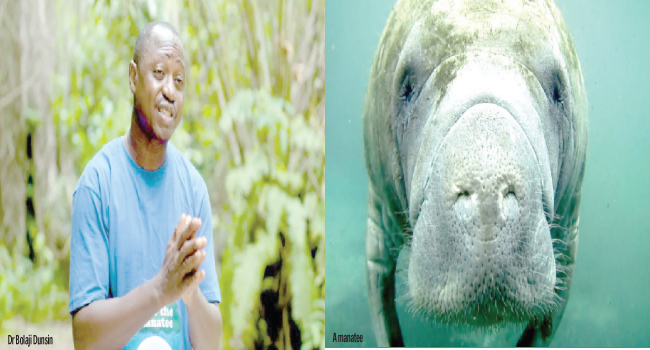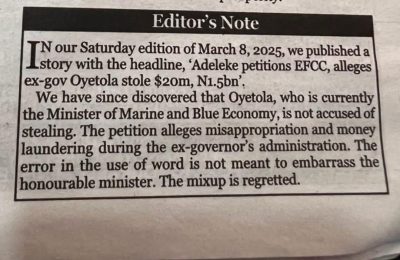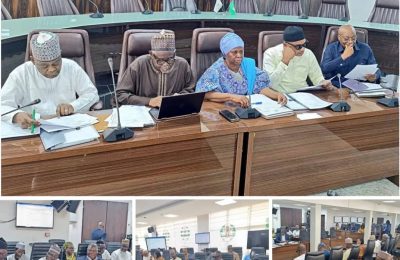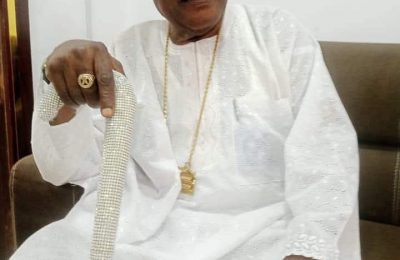Dr Bolaji Dunsin is the African Manatee’s unsung hero. His work in research, conservation, and education has left a significant impact on the marine mammals, sometimes known as sea cows and the people who live and work around their population.
Dr Dunsin Bolaji received his PhD in marine sciences from the University of Lagos and has been the chief research officer for the Nigerian Institute for Oceanography and Marine Research for 15 years. Though his research has been pivotal for understanding and protecting manatee populations across West Africa and the globe, Bolaji’s work goes far beyond the scientific.
“We’ve gone to communities across the waters to educate them and to empower them on alternative livelihoods,” said Bolaji in reference to communities who hunt manatees.
These manatee hunters build cages along the water into which manatees unsuspectingly swim and get stuck. The hunters then kill them with weapons.
To slow the hunting of these animals, Bolaji’s work has three main aims.
First, he works to educate the hunters on the beauty of manatees.
“It’s not a fast-growing population,” he explained. The gestation period for a manatee is around two years; with the rate at which they are hunted, it is impossible for the mammals to bolster their population fast enough to fight extinction. By educating hunters about this, they understand that if their work continues at this rate, future generations may not have the privilege of knowing manatees.
Next, and most importantly, Bolaji gives the hunters an opportunity for alternative livelihoods. He teaches them how to build effective and sustainable fish cages so they can easily and successfully transition out of hunting while still earning a viable income.
“Cage culture is not new,” Bolaji said. “However, the use of cage culture as an alternative measure to conserve the manatee was first done by me.”
Now others are beginning to take these methods of presenting alternative livelihoods into more hunting areas across West Africa.
Last, Bolaji continues educating not only hunters and fishers, but all community members on the importance of manatees and respecting the balance of delicate ecosystems.
“I have conducted a number of outreaches in secondary schools targeting the children of these hunters, or communities that have been identified to engage in the killing of manatee… we see that these young ones get back home, educate their parents, and let them know that, one: it is not right to hunt; two: their hunting is protected by law; three: you can be jailed.”
Educating the children in these communities in addition to the adults hammers home the importance of the manatees. It increases awareness and discourages the children of hunters and their communities from doing the same.
Although hunting manatees is illegal in Nigeria, enforcement of the law falls short. The culture of silence and secrecy around hunting in certain communities make it difficult for the police or the National Environment Standards and Enforcement Agency to make successful arrests.
But punitive results are not the most important. Although a hunter may not be fined or jailed for their impact, the manatees that they capture can sometimes be rehabilitated or released. And this alone, for Bolaji, is success.
In addition to his work in conservation and outreach, Bolaji conducts research on manatees’ habits and populations. With the donation of a single acoustic monitor, Bolaji and his team are able to get the inside scoop on manatee sounds; this allows them to understand more about the population and habits in a given area
But the lone acoustic monitor is not enough. “Our biggest challenge is funding,” he said. “We’ve not really been able to get good grants to be able to carry out intensive work.” Without it, the research and outreach both grind to a halt. But until that happens, Bolaji will be working with and for the manatees.
“Manatees are gentle, harmless,” he said. “They are beautiful. And they have been faced with a lot.”
This article has been republished under a partnership between Wild Africa and South African Publication, Daily Maverick.
READ ALSO: Exploring Dubai’s Marine Life with a Yacht Rental








